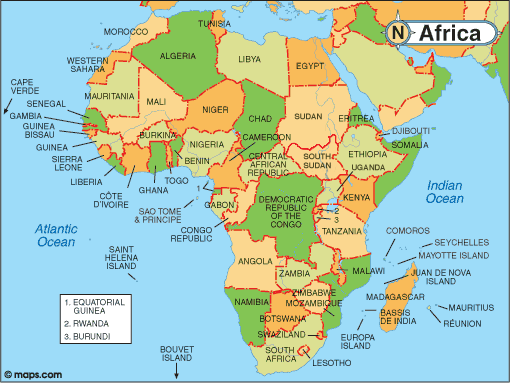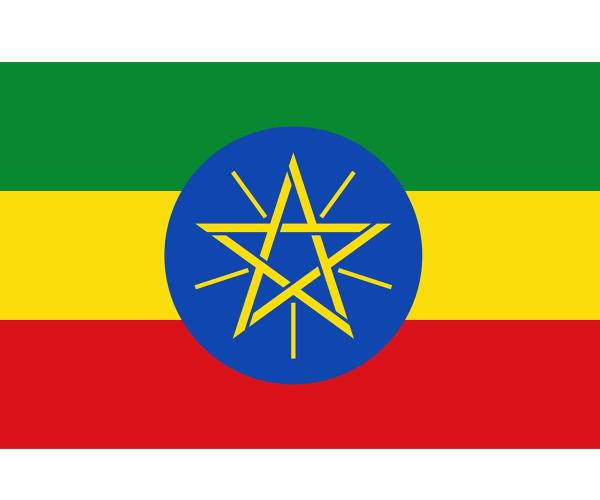Africa Map: Regions, Geography, Facts & Figures
On the map of the world, Africa is the second-most populous continent in the world, with over 1.3 billion people spread across 54 countries, making it incredibly diverse. From the ancient pyramids of Egypt, the lush Nile, the vast Sahara Desert, and the variety of vibrant capital cities, Africa is home to some of the world's most iconic landmarks and natural wonders. With a rich history that dates back to prehistoric times, Africa has been shaped by a complex mix of cultures and influences. This map of Africa aims to provide a glimpse into the continent's geography, history, and tourist attractions, highlighting some of the most breathtaking sights that Africa has to offer.
Click on a country in the map index for a more detailed map.

History of Africa
The African continent has a rich history that dates back to prehistoric times. Africa was the birthplace of human civilization, and the ancient Egyptians were one of the most advanced civilizations in the world. The continent was later colonized by European powers, which had a significant impact on its history and development.
Geography of Africa
Africa is the world's second-largest continent, covering an area of 30.2 million square kilometers. It is bordered by the Mediterranean Sea to the north, the Atlantic Ocean to the west, the Red Sea and the Indian Ocean to the east, and the Sahara desert to the north. The continent is divided into five regions: North Africa, West Africa, Central Africa, East Africa, and Southern Africa. Some of the major cities in Africa include Cairo, Lagos, Johannesburg, Nairobi, and Casablanca.
Tourist Attractions in Africa
Africa is home to a wide range of tourist attractions, including historical landmarks, natural wonders, and wildlife reserves.
Historical Landmarks
Some of the most famous historical landmarks in Africa include the Pyramids of Giza and the Great Sphinx in Egypt, as well as the ancient cities of Timbuktu and Djenné-Djenno in Mali. Lalibela in Ethiopia is known for its stunning rock-hewn churches, while Carthage in Tunisia is an ancient city that was once a powerful center of trade and culture in the Mediterranean world.
Natural Wonders
Africa boasts a wide range of natural wonders, with some of the most breathtaking sights in the world. Visitors can marvel at the majestic Victoria Falls, which straddles Zambia and Zimbabwe, or climb to the peak of Mount Kilimanjaro, the highest mountain in Africa. The vast Sahara Desert, which spans multiple countries in North Africa, is a sight to behold, with its expansive dunes and harsh, unforgiving landscape. The Ngorongoro Crater in Tanzania offers a unique opportunity to see a variety of wildlife in a natural setting, while the Okavango Delta in Botswana is a paradise for bird watchers and nature lovers. The Serengeti National Park, which spans Tanzania and Kenya, is home to some of the world's most impressive animals.
Wildlife Reserves
Africa is also home to many renowned wildlife preserves, where visitors can see a variety of animals in their natural habitats. Some of the most popular reserves include Kruger National Park in South Africa, Masai Mara National Reserve in Kenya, and Virunga National Park in the Democratic Republic of Congo. These reserves, as well as Etosha National Park, Namibia, and Bwindi Impenetrable National Park, Uganda, offer visitors a chance to see some of Africa's most iconic animals, such as lions, elephants, giraffes, and gorillas.

People Also Ask...
If you're inspecting maps of Africa, you may have some queries about the region. Here are some of the most frequently asked questions, along with their answers.
How Many Countries Are in Africa?
There are 54 countries in Africa, making it the second largest and second-most populous continent in the world. Each of these countries has its own unique identity, shaped by a mix of factors including colonialism, geography, language, religion, and traditions. From the vast deserts of the Sahara in the north, to the lush rainforests of the Congo Basin in the center, and the savannas of the south, Africa is a unique and fascinating place.
What Language Do They Speak in Africa?
There are over 1,000 different languages and dialects spoken in Africa, with many countries having multiple official languages. Some of the most widely spoken languages include Arabic, Swahili, Hausa, Yoruba, Amharic, and Zulu. The choice of language often depends on factors such as colonial history, geography, and cultural traditions.
What Is Africa Called in Africa?
Africa is referred to by different names in different regions of the continent. In the Swahili language spoken in East Africa, the continent is called "Afrika." In South Africa, it is called "Afrika" in Afrikaans and "i-Afrika" in Zulu. In the Amharic language spoken in Ethiopia, it is called "አፍሪካ" (Afrika). However, there may be many other names for the continent in local languages.
What Are the Big 3 African Countries?
Three of the largest and most influential countries in Africa are Nigeria, Egypt, and South Africa.
Nigeria is the most populous country in Africa, with a diverse population of over 200 million people. Egypt is home to some of the world's most iconic ancient monuments, including the pyramids and the Sphinx. South Africa is a diverse country with a complex history, and is known for its stunning natural beauty, wildlife, and unique cultural heritage.
African Countries: Maps









